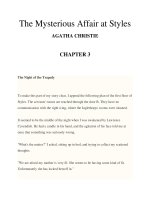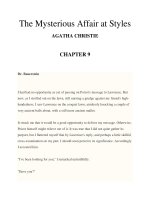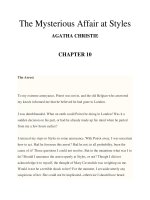The Secret Adversary AGATHA CHRISTIE CHAPTER 6 A Plan of Campaign A veil might with profit be docx
Bạn đang xem bản rút gọn của tài liệu. Xem và tải ngay bản đầy đủ của tài liệu tại đây (29.44 KB, 13 trang )
The Secret Adversary
AGATHA CHRISTIE
CHAPTER 6
A Plan of Campaign
A veil might with profit be drawn over the events of the next half-hour. Suffice it
to say that no such person as "Inspector Brown" was known to Scotland Yard. The
photograph of Jane Finn, which would have been of the utmost value to the police
in tracing her, was lost beyond recovery. Once again "Mr. Brown" had triumphed.
The immediate result of this set back was to effect a rapprochement between Julius
Hersheimmer and the Young Adventurers. All barriers went down with a crash,
and Tommy and Tuppence felt they had known the young American all their lives.
They abandoned the discreet reticence of "private inquiry agents," and revealed to
him the whole history of the joint venture, whereat the young man declared himself
"tickled to death."
He turned to Tuppence at the close of the narration.
"I've always had a kind of idea that English girls were just a mite moss-grown.
Old-fashioned and sweet, you know, but scared to move round without a footman
or a maiden aunt. I guess I'm a bit behind the times!"
The upshot of these confidential relations was that Tommy and Tuppence took up
their abode forthwith at the Ritz, in order, as Tuppence put it, to keep in touch with
Jane Finn's only living relation. "And put like that," she added confidentially to
Tommy, "nobody could boggle at the expense!"
Nobody did, which was the great thing.
"And now," said the young lady on the morning after their installation, "to work!"
Mr. Beresford put down the Daily Mail, which he was reading, and applauded with
somewhat unnecessary vigour. He was politely requested by his colleague not to be
an ass.
"Dash it all, Tommy, we've got to do something for our money."
Tommy sighed.
"Yes, I fear even the dear old Government will not support us at the Ritz in
idleness for ever."
"Therefore, as I said before, we must do something."
"Well," said Tommy, picking up the Daily Mail again, "do it. I shan't stop you."
"You see," continued Tuppence. "I've been thinking "
She was interrupted by a fresh bout of applause.
"It's all very well for you to sit there being funny, Tommy. It would do you no
harm to do a little brain work too."
"My union, Tuppence, my union! It does not permit me to work before 11 a.m."
"Tommy, do you want something thrown at you? It is absolutely essential that we
should without delay map out a plan of campaign."
"Hear, hear!"
"Well, let's do it."
Tommy laid his paper finally aside. "There's something of the simplicity of the
truly great mind about you, Tuppence. Fire ahead. I'm listening."
"To begin with," said Tuppence, "what have we to go upon?"
"Absolutely nothing," said Tommy cheerily.
"Wrong!" Tuppence wagged an energetic finger. "We have two distinct clues."
"What are they?"
"First clue, we know one of the gang."
"Whittington?"
"Yes. I'd recognize him anywhere."
"Hum," said Tommy doubtfully, "I don't call that much of a clue. You don't know
where to look for him, and it's about a thousand to one against your running against
him by accident."
"I'm not so sure about that," replied Tuppence thoughtfully. "I've often noticed that
once coincidences start happening they go on happening in the most extraordinary
way. I dare say it's some natural law that we haven't found out. Still, as you say, we
can't rely on that. But there are places in London where simply every one is bound
to turn up sooner or later. Piccadilly Circus, for instance. One of my ideas was to
take up my stand there every day with a tray of flags."
"What about meals?" inquired the practical Tommy.
"How like a man! What does mere food matter?"
"That's all very well. You've just had a thundering good breakfast. No one's got a
better appetite than you have, Tuppence, and by tea-time you'd be eating the flags,
pins and all. But, honestly, I don't think much of the idea. Whittington mayn't be in
London at all."
"That's true. Anyway, I think clue No. 2 is more promising."
"Let's hear it."
"It's nothing much. Only a Christian name Rita. Whittington mentioned it that
day."
"Are you proposing a third advertisement: Wanted, female crook, answering to the
name of Rita?"
"I am not. I propose to reason in a logical manner. That man, Danvers, was
shadowed on the way over, wasn't he? And it's more likely to have been a woman
than a man "
"I don't see that at all."
"I am absolutely certain that it would be a woman, and a good-looking one,"
replied Tuppence calmly.
"On these technical points I bow to your decision," murmured Mr. Beresford.
"Now, obviously this woman, whoever she was, was saved."
"How do you make that out?"
"If she wasn't, how would they have known Jane Finn had got the papers?"
"Correct. Proceed, O Sherlock!"
"Now there's just a chance, I admit it's only a chance, that this woman may have
been 'Rita.' "
"And if so?"
"If so, we've got to hunt through the survivors of the Lusitania till we find her."
"Then the first thing is to get a list of the survivors."
"I've got it. I wrote a long list of things I wanted to know, and sent it to Mr. Carter.
I got his reply this morning, and among other things it encloses the official
statement of those saved from the Lusitania. How's that for clever little
Tuppence?"
"Full marks for industry, zero for modesty. But the great point is, is there a 'Rita'
on the list?"
"That's just what I don't know," confessed Tuppence.
"Don't know?"
"Yes. Look here." Together they bent over the list. "You see, very few Christian
names are given. They're nearly all Mrs. or Miss."
Tommy nodded.
"That complicates matters," he murmured thoughtfully.
Tuppence gave her characteristic "terrier" shake.
"Well, we've just got to get down to it, that's all. We'll start with the London area.
Just note down the addresses of any of the females who live in London or
roundabout, while I put on my hat."
Five minutes later the young couple emerged into Piccadilly, and a few seconds
later a taxi was bearing them to The Laurels, Glendower Road, N.7, the residence
of Mrs. Edgar Keith, whose name figured first in a list of seven reposing in
Tommy's pocket-book.
The Laurels was a dilapidated house, standing back from the road with a few grimy
bushes to support the fiction of a front garden. Tommy paid off the taxi, and
accompanied Tuppence to the front door bell. As she was about to ring it, he
arrested her hand.
"What are you going to say?"
"What am I going to say? Why, I shall say Oh dear, I don't know. It's very
awkward."
"I thought as much," said Tommy with satisfaction. "How like a woman! No
foresight! Now just stand aside, and see how easily the mere male deals with the
situation." He pressed the bell. Tuppence withdrew to a suitable spot.
A slatternly looking servant, with an extremely dirty face and a pair of eyes that
did not match, answered the door.
Tommy had produced a notebook and pencil.
"Good morning," he said briskly and cheerfully. "From the Hampstead Borough
Council. The new Voting Register. Mrs. Edgar Keith lives here, does she not?"
"Yaas," said the servant.
"Christian name?" asked Tommy, his pencil poised.
"Missus's? Eleanor Jane."
"Eleanor," spelt Tommy. "Any sons or daughters over twenty-one?"
"Naow."
"Thank you." Tommy closed the notebook with a brisk snap. "Good morning."
The servant volunteered her first remark:
"I thought perhaps as you'd come about the gas," she observed cryptically, and shut
the door.
Tommy rejoined his accomplice.
"You see, Tuppence," he observed. "Child's play to the masculine mind."
"I don't mind admitting that for once you've scored handsomely. I should never
have thought of that."
"Good wheeze, wasn't it? And we can repeat it ad lib."
Lunch-time found the young couple attacking a steak and chips in an obscure
hostelry with avidity. They had collected a Gladys Mary and a Marjorie, been
baffled by one change of address, and had been forced to listen to a long lecture on
universal suffrage from a vivacious American lady whose Christian name had
proved to be Sadie.
"Ah!" said Tommy, imbibing a long draught of beer, "I feel better. Where's the
next draw?"
The notebook lay on the table between them. Tuppence picked it up.
"Mrs. Vandemeyer," she read, "20 South Audley Mansions. Miss Wheeler, 43
Clapington Road, Battersea. She's a lady's maid, as far as I remember, so probably
won't be there, and, anyway, she's not likely."
"Then the Mayfair lady is clearly indicated as the first port of call."
"Tommy, I'm getting discouraged."
"Buck up, old bean. We always knew it was an outside chance. And, anyway,
we're only starting. If we draw a blank in London, there's a fine tour of England,
Ireland and Scotland before us."
"True," said Tuppence, her flagging spirits reviving. "And all expenses paid! But,
oh, Tommy, I do like things to happen quickly. So far, adventure has succeeded
adventure, but this morning has been dull as dull."
"You must stifle this longing for vulgar sensation, Tuppence. Remember that if
Mr. Brown is all he is reported to be, it's a wonder that he has not ere now done us
to death. That's a good sentence, quite a literary flavour about it."
"You're really more conceited than I am with less excuse! Ahem! But it certainly
is queer that Mr. Brown has not yet wreaked vengeance upon us. (You see, I can
do it too.) We pass on our way unscathed."
"Perhaps he doesn't think us worth bothering about," suggested the young man
simply.
Tuppence received the remark with great disfavour.
"How horrid you are, Tommy. Just as though we didn't count."
"Sorry, Tuppence. What I meant was that we work like moles in the dark, and that
he has no suspicion of our nefarious schemes. Ha ha!"
"Ha ha!" echoed Tuppence approvingly, as she rose.
South Audley Mansions was an imposing-looking block of flats just off Park Lane.
No. 20 was on the second floor.
Tommy had by this time the glibness born of practice. He rattled off the formula to
the elderly woman, looking more like a housekeeper than a servant, who opened
the door to him.
"Christian name?"
"Margaret."
Tommy spelt it, but the other interrupted him.
"No, G U E."
"Oh, Marguerite; French way, I see." He paused, then plunged boldly. "We had her
down as Rita Vandemeyer, but I suppose that's incorrect?"
"She's mostly called that, sir, but Marguerite's her name."
"Thank you. That's all. Good morning."
Hardly able to contain his excitement, Tommy hurried down the stairs. Tuppence
was waiting at the angle of the turn.
"You heard?"
"Yes. Oh, Tommy!"
Tommy squeezed her arm sympathetically.
"I know, old thing. I feel the same."
"It's it's so lovely to think of things and then for them really to happen!" cried
Tuppence enthusiastically.
Her hand was still in Tommy's. They had reached the entrance hall. There were
footsteps on the stairs above them, and voices.
Suddenly, to Tommy's complete surprise, Tuppence dragged him into the little
space by the side of the lift where the shadow was deepest.
"What the "
"Hush!"
Two men came down the stairs and passed out through the entrance. Tuppence's
hand closed tighter on Tommy's arm.
"Quick follow them. I daren't. He might recognize me. I don't know who the other
man is, but the bigger of the two was Whittington."









